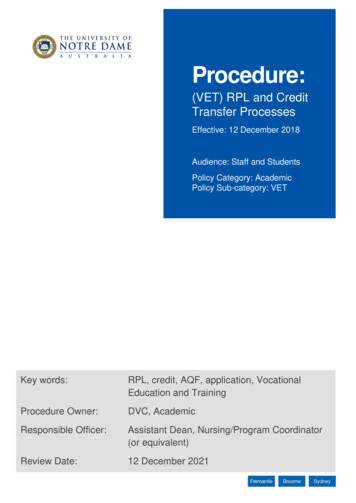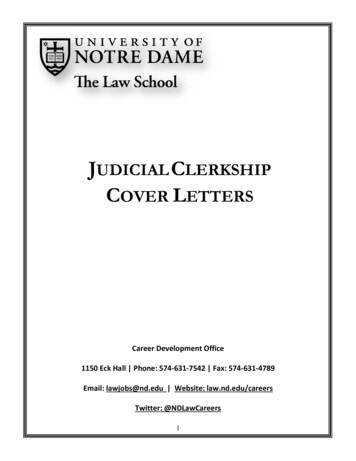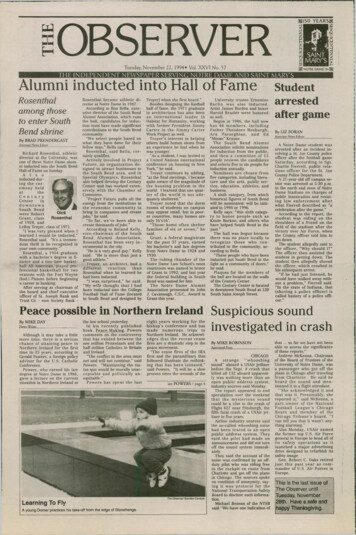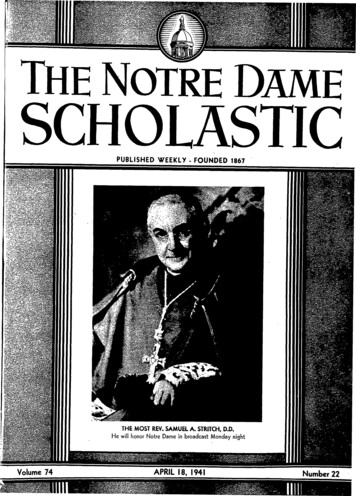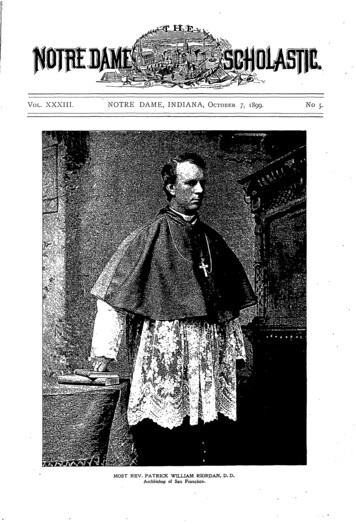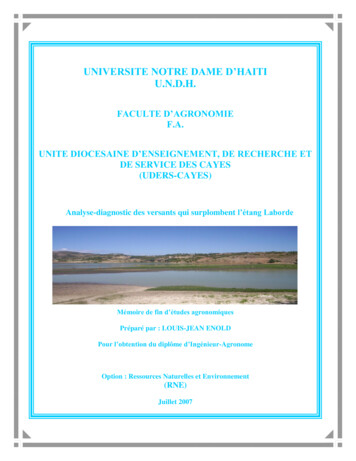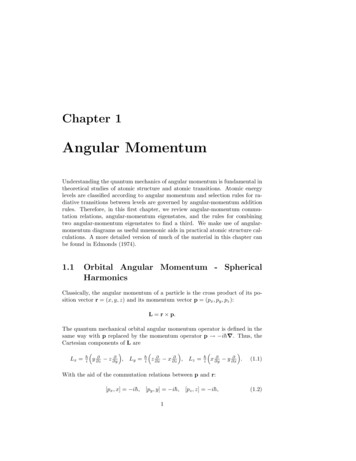
Transcription
N OTRE D AME R EVIEW
N OTRE D AME R EVIEWN U M B E R8EditorsJohn MatthiasWilliam O'RourkeSenior EditorSteve TomasulaFounding EditorValerie SayersManaging EditorEditorial AssistantsKathleen J. CanavanKelley BeesonStacy CartledgeR. Thomas CoyneContributing EditorsDouglas CurranMatthew BenedictJeanne DeVitaGerald BrunsShannon DoyneSeamus DeaneAnthony D'SouzaStephen FredmanKatie LehmanSonia GernesMarinella MacreeJere OdellTom O'ConnorKymberly Taylor HaywoodRod PhasoukJames WaltonGinger PiotterHenry WeinfieldLaura SchaferDonald SchindlerElizabeth Smith-MeyerCharles WaltonThe Notre Dame Review is published semi-annually. Subscriptions: 15(individuals) or 20 (institutions) per year. Single Copy price: 8. Distributed by Media Solutions, Huntsville, Alabama andInternational Periodical Distributors, Solana Beach, California. We welcome manuscripts, which areread from September through April. Please include a SASE for return. Please send all subscription andeditorial correspondence to: Notre Dame Review, The Creative Writing Program, Department of English,University of Notre Dame, Notre Dame, IN 46556.Notre Dame Review copyright 1999 by the University of Notre DameISSN: 1082-1864Place/Displacement ISBN 1-892492-07-5Cover Art: "Diagram for the Apprehension of Simple Forces," cibiachrome, 1997, 12 x 15 inches, byJason Salavon. Courtesy of Peter Miller Gallery, Chicago.
C ONTENTSGenghis Khan story . 1Yanbing ChenAnstruther; Knowledge; Alford poetry . 26Robert CrawfordExposure poetry . 30Corrinne Clegg HalesThe Same Hour Has Come inside My Body poetry . 32Alison JarvisHerson; The Orders poetry . 34John EngelsGhosts story . 38Ed FalcoAnnointing the Unprepared poetry . 46G.E. MurrayTrompe L'Oeil poetry . 47Kevin PruferThe Bench at Fontainebleau poetry . 49John PeckGrandmother Crow poetry . 51Teresa IversonTrapped in the Catskills poetry . 53David M. KatzGetting Language poetry . 55Linda KinnahanRaised Arms story . 57Christie HodgenLove Penned Red poetry . 67Sean Brendan-Brown
Walking poetry (excerpts) . 68Rob FaivreWestward the Course of Empire art . 71Don PollackHeartland art . 72Don PollackBitter Algae poetry . 73Orlando Ricardo MenesThe Butterfly Project poetry . 76Tom SmithMarriage of Convenience story . 79Harriet McBryde JohnsonHistory; Michael Furey poetry . 88Kelly RitterLament poetry . 90Kelly Le FaveLook; At Nags Head; A Jack Spicer Notebookpoetry . 91John LattaFishing the Plains; Hahasatigii story . 98Melita SchaumIce Floes poetry . 106David SandersThe Bearded Seal; Ophelia at Midnight poetry . 107Neil AzevedoThe Poet as Oracle poetry . 109Jan Lee AndeBarophobia poetry . 110David StarkeyJoseph; The Ugly Duckling poetry . 111Lee Upton
Ritardando: That Lack; Two Homings poetry . 113Sharon CournoyerThe Last Days of Atlantis story . 118Eugene WildmanEscape From the Orkneys; Just One Look poetry . 128Robert HahnCezanne's Atelier Near Aix poetry . 133Samuel HazoBernard Baruch poetry . 135Baron WormserThe Beautiful Monk poetry . 137Kevin Di CamilloThe Triumph of Love review . 138Peter RobinsonCollected Poems of Eugenio Montale review . 143John PeckThe Poet's Companion review . 147George HeldHotel Malabar review . 151Diane MehtaMost Way Home short review . 154Kevin Di CamilloIdentity short review . 155Stacy CartledgeEditors Select . 156Contributors’ Notes . 158
P LACE /D ISPLACEMENTJason Salavon, Diagram for the Apprehension of Simple Forces, 1997,cibiachrome, 12 x 15 inches. Courtesy of Peter Miller Gallery, Chicago.
Y A N B I N GC H E NG ENGHIS K HANYanbing ChenI“What’s up?” Lee sounded as upbeat as ever at the other end of the line.“Everything,” I said. “Rent, tuition, phone bill, insurance, everythingexcept my god-damned wage, still four twenty-five an hour.”“You still washing dishes at the school?”“What else can I do?”“Too bad,” he said. There was a short silence, as if he were trying tothink of a way to get me out of my lousy situation. “Do you have to worktonight?” he said after a while.“No,” I said. Tuesday was my only night off.“Good. There’s a new casino open in Joliet. You wan’ go?”“I don’t have any money,” I said.“Fifty bucks’s all you need. We don’t play no big. You lose, you leave.But who knows, maybe we’ll hit a jackpot and never have to work again.”“If you wanna go, go yourself.”“I can’t. That piece’v junk of mine broke down last week. Think it asyou do me a favor, OK?”By the time we pulled into the huge parking lot outside The EmpressCasino, it was already packed with Mercedes, BMWs, and Lincolns. Butthere were the other types as well: a rusty ’78 Oldsmobile with its passenger’sside window missing, an ancient beat-up Mustang, a shiny little Yugo. Mycar, of course, fitted more comfortably in their company.Lee made his usual car talk as we cut through the parking lot.“That’s a good one.” Lee patted the hood of a Continentalconvertible with the top down. “V-8 engine, turbo-charged, 120 miles anhour no problem.”“How about this?” I pointed at a red Renault parked next to it.“Junk.” He kicked its tire. “Don’t ever buy a Renault in this country.They’re all junks.”With all his knowledge, it was funny though, that Lee had bought onebad car after another. The problem, he explained, was not the lack ofexpertise, but that of money. “You can’t buy a Rolls Royce for fivehundred bucks.”The admission turned out to be fifteen dollars, something Lee claimedto be unheard of.1
N O T R ED A M ER E V I E W“Fifteen bucks just to get in?” Lee challenged the girl in the black andwhite uniform behind the counter, “In Las Vegas, they even gave me moneyto spend!”“This ain’t no Vegas, sir,” the girl said, hands perched on the computerkeyboard, eyes glued to the screen. “You decide if you want to go in or not.Next!”That reduced my fortune-making fund by almost a third. With thequarter tokens barely filling the smallest cup, I headed straight to the slotmachines. Lee said he was going to look around for a while, checking outthe dealers at the Black Jack tables.I wandered along the aisles, dropping a token here, a token there.Finally I settled down at a machine that spewed out twenty on my secondtry. All around, the only thing you hear was the sound of tokens spat out ofthe machines, clink, clank, clink, clank. For a moment you would thinkeverybody was winning. I read the instructions: 1 for blank, 2 for cherries,5 for any 2 fruits, . 80 for 3 bars. and three cherries, the Jackpot— 5623.75. 5624.50. 5625.25. The figure in the electronic displaykept increasing.“Put in three at a time, then you can get it to pay at all three lines,”a middle-aged man in overalls at the next machine said, a tip. Buthaving only thirty-five dollars in the cup, I alternated—three times single,one double, three times single, one triple—hoping that would last me alittle longer.Lee and I met working at a restaurant in Chinatown two years ago. Iwas a busboy, and he a waiter. I had just come from China, and wasenrolled at East-West as a Ph.D. candidate in philosophy. Though mytuition was prepaid with my application—a policy which I found out onlylater was rare in this country—the monthly rent of 250 for my sleepingroom in a rundown apartment house on Sam Davis Avenue was making mymoney run out like rice in a leaking sack. I was, therefore, very grateful tothe Cantonese owner of the restaurant when he hired me, asking for neitherwork permit nor experience. Three thirty every afternoon, I rode a squeaking bike, which I had picked up for five bucks at a rummage sale, throughthe dozen blocks swarming with people of all nationalities to the restaurantlodged between a bakery and an oriental pharmacy on Wentworth, pondering all along the ontological differences between Spinoza and Confucius.Lee had been working there for several months. Originally from HongKong, he came to the States fifteen years ago. He spoke Cantonese, Hakka,but no Mandarin, so the two of us had to communicate through pidginEnglish, which he was very good at. Lee taught me how to set the table,2
Y A N B I N GC H E Nhow to fold napkins into flowers, how to carry six glasses in one hand andthen put an ashtray on top; and later, how to wrap Moo Shu, how to servechampagne, and how to take the change back to the customer non-offensively when it was not enough for the tip. But the restaurant went out ofbusiness a few months later. Lee found another job across the street, whileI, it being no longer possible to ride a bike in winter, moved to the dormand settled down to washing dishes in the school cafeteria.My first big hit was “three bars,” 80, but it came on a single shot.“See, I told you to put in three at a time. It would’ve been 240,” theman in overalls said, shaking his head.But I was happy enough with this windfall. Scooping the tokens intomy cup, I looked around for Lee. He was nowhere to in sight. Ignoringonce again my neighbor’s advice, I continued with my pattern.When the bell burst into a blast at the other end of the floor, I hadaltogether three decent hits, one 50, another 80, and one 160—finallycaught one with two tokens.The bell kept on.“What’s that?” I asked the man in overalls, who had stopped feedingthe machine and was looking towards the other end.“Somebody’s hit a jackpot,” he said. I followed his eyes and saw a littlered light above one of the machines flashing and spinning like the kind ontop of an ambulance.“Really?” I asked.“Oh, yeah,” he said. Slowly, the corners of his mouth lifted into a grin,as if he himself were only beginning to understand the meaning of his ownannouncement.“How much you think it is?”“Oh, those are the dollar machines. Must be quite a lot. I’ve been hereall the time since this morning and haven’t heard the bell ring till now. Goand check it out.”I went over.“Fuck.” Lee was grumbling two machines away from the one that wasmaking all the noise.“That was mine,” he said, pointing to the old Latino lady sitting infront of the winning machine like a stone corpse, staring at the three 7scentered on the middle line—red, blue, and white, perfect order—deaf andmute to the uniformed attendants around coaxing her to take a picture.“That was mine,” Lee hissed. “I was playing that one when she came upand said she was playing that one since yesterday and had just stepped awayto go to the bathroom. Fuck ye mother I gave it to her!” He dropped the3
N O T R ED A M ER E V I E Wlast two tokens in his cup into the machine and pulled the lever—nothing.“Ai,” he slapped his thigh and stood up, heading for the change counter.I traded all my tokens for plastic chips at the counter and picked a fivedollar Black Jack table to try my luck. It didn’t go too bad. At least I wasn’tlosing. By the time Lee came over, I even had a small pile of additionalchips on the side. I had just won three times in a row.“What are you doing playing so tiddy-bitty?” Lee yelled when he saw Ileft only two chips in the hole for next hand after collecting my winnings.“Play big. Got to play big when you’re strong.”There were only two more hands left before the time was up for thiscruise. I was tempted.“Are you sure?” I asked.“Of course. That’s the rule,” he said, and nudged another five chips ofmine over.The dealer hit a Black Jack right on, and swept the table clean.“Big, big.” Lee poked at me as I hesitated about the last bet. “Lasthand, I don’t think she be that lucky again.”I slapped a whole pile in the hole. Ten chips, fifty dollars.6 and 5. The face card of the dealer was 3.“Double!” Lee poked at me again. “She be busted.”I pushed another pile over.“Te-n-n-n!” Lee intoned as if performing some kind of a black magic asthe dealer drew out my double card. It was an 8.“Not bad, not bad,” he said, “you win for sure.”The dealer’s turn. Her bottom card was 2. Ace, 10, and.4! That addsup to 20.“Fuck.” Both Lee and I slammed down on the table with our fists.The cruise was over.Back in my car, I asked Lee if he had lost all of his fifty dollars.“Fifty!” He jumped, as if my question were a great insult. “You reallybelieved me, did you? Ten times!”I didn’t ask anything more, but figured how many tables he had to waiton before he could earn that much back.“How’s work?” I asked when we stopped for breakfast at a Hardee'salong the Interstate, “Still working at the Cantonese Chef?”“I quit.”“When?”“Two days ago. Had a fight with that son of a turtle.”“What happened?”“Don’t ask me about it.” He blew at the coffee the way one would a4
Y A N B I N GC H E Nmug of tea with the leaves floating on top. “That son of a turtle, the hellwith him!” Across the aisle, a man in a flannel shirt with rolled-up sleevessat alone at a table drinking coffee from a thermal cup; two tables down, afat sleepy-eyed woman was blowing smoke rings over the remains of herbreakfast.“You want to work in the restaurant again?” Lee asked after a while,crumpling the sandwich wrapper into a ball and stuffing it in his emptycup. “We can go and look for a good place together.”That was not a bad idea. The spring semester was about to end, andboth the cafeteria and the dorm would be closed, which meant I would haveto look for another job as well as a place to live.“How about we wait till I’m done with school?” I said.“When’s that?”“In three weeks.”“Nah,” he said, wiping off the stain his mug had made on the table.“Too late. If you want to go, we go now. When everybody’s out of school,you won’t even have soup left.”IIAfter checking out a dozen Golden Dragons, Imperial Palaces andChina Houses all around Chicago, we found a place called Genghis Khanin Wheeling.“What can I do for you?” A man in his fifties sitting behind the barreading a Chinese newspaper looked up at us from behind a pair of blackrimmed glasses.That was Wong, the owner of Genghis Khan. It turned out that one ofhis waiters was going back to Hong Kong to get married, and another wasopening a restaurant of his own. He said he would try us out that night.“No use fooling around with me, OK? I can tell by just watching youwait on a few tables.”Compared with that little Dim Sum place in Chinatown, GenghisKhan was a real restaurant, and five times busier, but Lee and I worked as ateam, and didn’t have too much trouble. By the time the last table wasgone, we literally had money dropping out of our pockets.“Not bad, uh?” Lee said as I counted my tips in the car. I didn’t changethem into large bills as Lee did. It felt good having a pocket full of money,even just for a little while.If you are someone who did not have enough sleep, then the alarmclock must be your worst enemy. It always starts to beep at the best part ofyour dream, though in most cases the dream is gone the moment you open5
N O T R ED A M ER E V I E Wyour eyes. But that makes you all the more angry because you’ve just beendeprived of even the memory of pleasure, which might be the only consolation you have to last you through the day. But that’s something you justhave to put up with because things would be only worse when the clockgoes on a strike and you wake up to find half the day already gone. Mydaily routine during the last three weeks of that semester started at five witha mug of strong tea. After ironing my shirt, vest and trousers for thenight—first things first—I would start working on the two fifteen-pagepapers due before the end of the term. On Tuesdays and Thursdays I wentto class at one, and then, at three, headed off to Chinatown to pick up Leeand go to work—we had worked out with the boss that as soon as I wasdone with school, both of us would come and work full time. By the time Igot back home it would be around midnight. A couple of times I woke upearly in the morning and found I had dropped dead on the bed withouteven taking my clothes off.The day I went to turn in my last paper at the department office, thesecretary told me Dr. Freeland, chair of the department, wanted to see me.“You must have heard about Professor Skretkowicz,” Dr. Freeland saidafter I sat down.“No,” I said. Skretkowicz was my thesis director. “What happened?”“Professor Skretkowicz died of a heart attack two days ago.” Dr.Freeland paused, taking off his glasses. “I am very sorry.”“I’m sorry, too,” I said, but had no glasses to take off.“I understand you have worked closely with Professor Skretkowicz andam so sorry that the relationship between you two had to be terminated thisway.” He replaced his glasses. “As I understand, you’ve finished all yourcourse work, but have not completed your thesis yet. Am I right?”“That’s right.”“And your thesis is a comparative study of the philosophies of Spinozaand Confucius?”“Correct.”“You may well know that Professor Skretkowicz was the only expert inoriental philosophy in our department.”“Yes, I know. That’s why Professor Skretkowicz became my thesisdirector.”“Now that he’s gone.eh.passed away, I mean, we are really diminishedin our ability to guide your present thesis. Do you think there is anypossibility that you might choose a different topic at this stage?”“Well, I’m afraid it would be quite difficult now, Dr. Freeland,” I said.“Oh I understand your situation perfectly. I was only making a6
Y A N B I N GC H E Nsuggestion. Of course there’s always the possibility that we hire somebodyfrom another school to read your thesis, but that .” he paused “.could bedifficult sometimes.”“The alternative,” he said after a while, “though I hate to say it, will beyou to transfer to another school.” He looked away at the books on the shelffor a moment. “But don’t get me wrong, we don’t really want to lose you.”I followed his eyes to the bookshelf, saw nothing in particular, andsaid nothing.“Anyway, you don’t have to make the decision now. Think about it, andlet me know before classes start next semester. All right?”So, I thought as I walked down the dim corridor, that was about theend of the friendship between Confucius and Spinoza.Lee was right. Almost everyday the first two weeks after we startedworking full time at Genghis Khan, people called or just walked in, lookingfor jobs. We were lucky to have made the right move in time. We madegood money, an average of seventy dollars per day, not including our wage.The wage was fourteen dollars a day, well below the 2.19/hour minimumfor waiters if you divided it by ten, roughly the number of hours we workedevery day. But nobody really bothered to argue as long as the tips weregood.To save money on rent and gas, Lee and I moved to the restaurant.The move was easy. Except for a few books and some clothes, I left allmy things in storage at school, and all of Lee’s belongings were packed easilyinto an old footlocker, two traveling bags and a few fortune cookie boxes.Our “dorm,” as Wong referred to it, was the space between two steel filecabinets and an old sagging canopy bed in the second-floor office ofGenghis Khan. We were not supposed to use the bed.“My wife might need to take a nap there in the afternoon sometimes,and when she’s in there, you keep out, OK?” That was the condition underwhich the key—there was only one—was handed over to us.Most times, however, Lee and I made our beds in the dining room bypulling the chairs together. Twelve chairs, and it was a quite comfortablebed. On some rainy nights when it got too chilly we would light up thefireplace, a fake with gas tubes hidden between cement logs. But we had towatch out for Wong, who sometimes after his mid-night Mahjong partywould sneak back and check up on us.Upstairs, next to another “dorm” shared by the amigos—Anastacio, thePick-up/Deep-fry, and Jose, the Dishwasher—Chef Wu, or Wu Shifu as wecalled him, lived alone in a small room. Thirty-six years old and wearing a7
N O T R ED A M ER E V I E Wpair of gold-rimmed glasses, he looked more like an accountant than a cook.Ever since coming over from Hong Kong six years ago, he had been workingfor Wong, twelve hours a day, six days a week. His salary, which he revealedonly reluctantly after our repeated probing, was 1600 a month. He had ahouse about twenty minutes’ drive away, but since his wife had run awaywith a white man two years ago and he had sent his son to his sister’s inNew York, he lived most of the time at the restaurant. Once Lee and Irented a Kung Fu movie from a grocery store in Chinatown and we allwatched it in Wu Shifu’s room. Aside from the TV and the VCR, the onlythings that could be called superfluous in his room were a few posters ofHong Kong movie stars printed by a noodle factory, and a framed photo ofhis wife and son propped up on a nightstand. When Lee asked why he keptthe photo of a woman who had dumped him, he said that it was the onlygood photo he had of his son.Anastacio used to be a professional bullfighter—Matador, as he calledit. Six and half feet, thick shoulders and strong muscles with a dash of blackmoustache, he did look like a man of the arena. Only his stomach wasgetting a little pouchy. “All this Chinese food,” he grinned, patting hisbelly. He was saving his money till he had enough to go back and open hisown Chinese Restaurant.IIIThe days got warmer. Business was booming. At the peak hour, Leeand I would each handle seven to eight tables. Anyone could wait on one ortwo tables, but to handle seven or eight all at once required a certain level ofcoordination. The key was timing. Soup, appetizer, entree, and dessert—anexperienced waiter like Lee could take all the tables at once and space themout in good order. “The Pot Stickers take about fifteen minutes, would youlike something to drink in the meantime?.How about some Chinese beer?Tsintao, you ever tried that?. Never? What a shame! You have to try it.Believe me, you wouldn’t be disappointed.The Mandarin Fish’s theSpecial tonight. It takes a little longer, but you’ll see it’s worth the wait.”Clear and efficient in the kitchen, pleasant and graceful in the dining room,a good waiter leads the customers by his smile, his joke, and his authority,and never loses his pace and composure; a mediocre waiter, on the otherhand, gets ordered around, tipping wine glasses and spilling soup intocustomers’ laps from time to time, barely catching up at either end. It wasclear I belonged to the soup-spilling type. There was no doubt about that.8
Y A N B I N GC H E NBut good or mediocre, you work hard. On Friday or Saturday night, bythe time Wong and his wife counted the bottles of beer left in the cooler,locked up the box where the air-conditioning switch was located, and left intheir white Mercedes, everyone was exhausted. Wu Shifu went to bedimmediately, Anastacio sprawled on the grass across the parking lot, whileLee and I sat at the table in the waiter’s section, for a long time not wantingto move. Only Jose seemed to have endless energy. After taking a showerand putting on his new shirt and black silk pants, he would slip out theback door with a cowboy hat in hand. Normally he wouldn’t be back untilthree or four in the morning. For him, the day had just begun.After a while, you got to know all the regulars: Mrs. Rosenberg wholived in the nursing home around the corner and wanted her tea boilinghot, Mrs. Culvert who came twice a week with her thirty-year-old imbeciledaughter who beat her plate with the chopsticks like a drum; on Wednesdays, Mr. Jones would drop in for lunch with a roll of newspaper whenalmost everyone else had left, ordering always Chicken Chop Suey with noMSG and leaving two quarters as a tip. And there was the high schoolbasketball coach with his skinny girlfriend, the insurance salesman in tieand suit adding up his invoices while waiting for his food, and the fourJapanese businessmen who came late every other Friday night and drankthree rounds of Tsintao and two pots of Sake, running the bill up to morethan a hundred, using always a calculator to determine the amount of thetip, fifteen percent, not a penny less, not a penny more.The thrill of earning cash daily, however, quickly decayed into tedium.As a waiter, all you ever needed to say were only a variation of about tensentences—”How are you doing today?” “Can I get you something todrink?.Are you ready to order?.Is everything all right?. Great!. Here’syour change.Thank you, Please come again.Thank you!.You have anice weekend!.Thank you!.Good night!.Good night!” Sometimes Ithought about writing a guidebook for working in Chinese restaurants andselling it to all those in China who were eager to come to the States. How toSurvive in a Chinese Restaurant in America, I would call it, and I couldguarantee it would be sold out overnight.Since coming to live at the restaurant, I had hardly read anything, letalone begun working on my thesis. Waiting on tables had numbed mysenses. But my body was getting strong. My muscles no longer felt sore bythe end of the day. As for the mind, there was no need. “Walking corpse,”Lee once said jokingly, “that’s what we are!” But sometimes in the afternoonafter the sidejobs were done, or at night when all the customers had left,sitting in the dining room, staring at the Happy Buddha in the half-9
N O T R ED A M ER E V I E Wdarkness, I felt the conversation with Dr. Freeland at the end the semestergrow like an ominous seed, bloated and sprouting in the tepid summer rain.Changing the topic of my thesis was almost out of the question—I wasalready more than halfway through my first draft. Besides, I didn’t find anyother topic that really interested me. Transferring to another school, on theother hand, could be costly, in terms of both time and money. The merethought of the coming fall sent my head spinning.“How long you still have to be in school?” Lee asked me one morningwhile we were still lying in our makeshift beds.“I don’t know,” I said, looking at the stained foam blocks of the ceiling.“Looks like it’s going to be longer than I expected.”“Then what? Can you get a better job?”“With a M.A in philosophy, probably not,” I said, turning over.“What use of study if you can’t get a good job out of it?” Lee sat up.A good question. What was the point of studying if you couldn’t get ajob with the degree? Lee was right.“Is it too late for you to switch the subject?” he asked, meaning mymajor.“I guess it is.”“Then start all over again. Stop your stupid comparison of Confuciusand Snowpizza. Go to another school and do something real.”Want it or not, I smirked, it didn’t seem likely Mr. Old Con. was goingto eat Snow Pizza anymore.“You speak good English. Why don’t you go to a Law School? You’llmake good money.”Well, that was what everybody else was doing and what I had beenresisting up till now.“You’re young and smart, there’re many things you can do,” he went on,but then sighed. “Not like me.”Lee dropped out of high school just before graduation the year he cameto the States with his brother, and had never gone back to school since. Fora while, we lay in the dim morning light and remained silent. A flock ofbirds hopped back and forth on the roof. Through the cracks, their chirping sounded distant but clear.IVOn Sundays, when there was no lunch at Genghis Khan, Lee and Iwent out. I would go and pick up my mail at the school, and Lee wouldeither go have a haircut or buy a pair of new shoes—shoes wear out fast ifyou work as a waiter—and then wait for me at Three Happiness in10
Y A N B I N GC H E NChinatown with a copy of Shijie Ribao—the World Daily. After lunch, wetook Lakeshore Drive to downtown. On a good day, the lake would be fullof sailboats; if we were lucky we could a find a meter on Columbus Driveand take a stroll in Buckingham Square.Instead of bringing me comfort, letters from old classmates in Chinaalways left me even more depressed. So-and-so got married, with a girl onceI knew quite well; so-and-so got a job in a foreign venture in Shengzhen,and was making 4000 yuan a month, ten times of the wage of an ordinaryclerk. Another sent a photo of himself leaning against a brand newMerc
The Poet's Companion review. 147 George Held Hotel Malabar review . 151 Diane Mehta Most Way Home short review. 154 Kevin Di Camillo Identity
